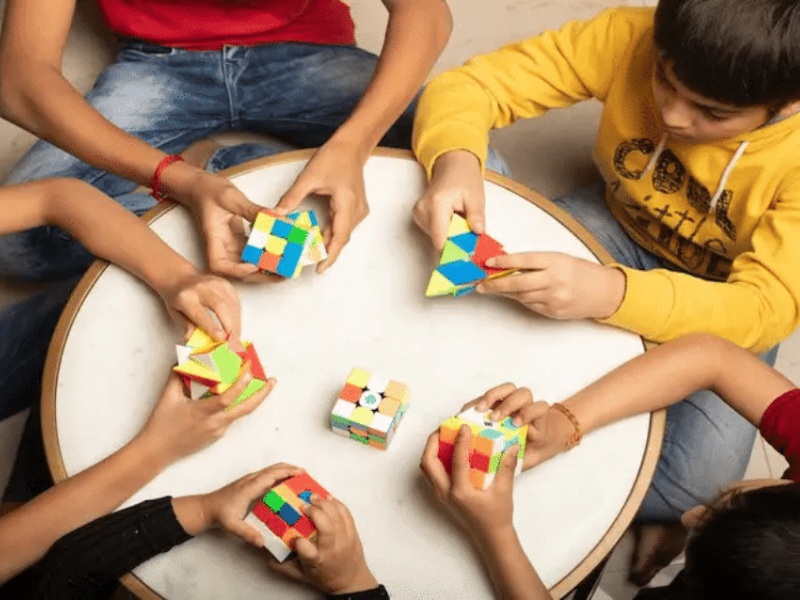
Puzzles have been a beloved pastime for generations, captivating both children and adults with their intriguing challenges and satisfying solutions. While puzzles are undeniably fun, they also offer significant educational benefits. From fostering cognitive development to enhancing problem-solving skills, puzzles play a crucial role in learning and development. In this blog, we will explore the multifaceted joys of puzzles and why they are an excellent choice for both play and education.
Cognitive Development

Enhancing Memory and Concentration
Puzzles require players to remember shapes, colors, patterns, and pieces. This constant mental engagement helps to enhance memory and improve concentration. Whether it’s a jigsaw puzzle that requires recalling the shapes and colors of pieces or a crossword puzzle that involves remembering vocabulary and facts, puzzles provide a workout for the brain.
Developing Problem-Solving Skills
Puzzles are essentially problems that need to be solved. They require players to think critically, analyze different possibilities, and find solutions. This process helps to develop strong problem-solving skills. For instance, when working on a jigsaw puzzle, a child must figure out how the pieces fit together, which involves spatial reasoning and logical thinking.
Boosting IQ and Cognitive Function
Studies have shown that engaging in puzzles can help to boost IQ scores and improve cognitive functions such as reasoning, attention, and memory. The mental exercise involved in solving puzzles stimulates brain cells and improves connections between them, making the brain more efficient and capable.
Emotional and Psychological Benefits

Building Patience and Persistence
Solving a puzzle requires patience and persistence. Children learn that they might not find the right piece immediately and that it’s okay to try different solutions. This helps build a growth mindset, teaching them that persistence and effort can lead to success.
Promoting Stress Relief
Puzzles can also be a great way to relax and unwind. The act of focusing on a single task and the satisfaction of finding the right piece can be very calming and meditative. This stress relief can be beneficial for both children and adults, providing a break from the hustle and bustle of daily life.
Enhancing Self-Esteem and Confidence
Completing a puzzle gives a sense of accomplishment and boosts self-esteem. Children feel proud when they finally put the last piece in place, and this success can translate to increased confidence in their abilities. It teaches them that they can achieve their goals with effort and determination.
Social Development

Encouraging Cooperative Play
Puzzles can be a great activity for cooperative play. When children work together to solve a puzzle, they learn to communicate, share, and collaborate. This teamwork helps to build social skills and fosters a sense of community and cooperation.
Family Bonding
Puzzles are an excellent way for families to spend quality time together. Working on a puzzle as a family can be a fun and engaging activity that brings everyone together. It encourages conversation, teamwork, and creates lasting memories.
Physical Development

Improving Fine Motor Skills
Manipulating puzzle pieces helps to develop fine motor skills in young children. Picking up, holding, and fitting pieces into place requires precise movements and coordination. This practice is beneficial for developing hand-eye coordination and dexterity.
Enhancing Hand-Eye Coordination
Puzzles also enhance hand-eye coordination. Children must see where a piece should go and then physically manipulate it to fit in place. This coordination between vision and movement is crucial for many other activities and skills, such as writing and sports.
Types of Puzzles and Their Benefits

Jigsaw Puzzles
Jigsaw puzzles are perhaps the most well-known type of puzzle. They come in various sizes and complexities, making them suitable for all age groups. Jigsaw puzzles enhance spatial reasoning, improve memory, and develop problem-solving skills.
Crossword Puzzles
Crossword puzzles are excellent for vocabulary development and general knowledge. They challenge players to think about words and their meanings, enhancing language skills and cognitive abilities.
Sudoku
Sudoku puzzles are number-based and require logical thinking and pattern recognition. They help to develop mathematical skills and improve concentration and problem-solving abilities.
3D Puzzles
3D puzzles add an extra dimension to traditional puzzles, requiring spatial reasoning and visualization skills. They are great for enhancing hand-eye coordination and fine motor skills.
Logic Puzzles
Logic puzzles, such as brainteasers and riddles, challenge players to think critically and creatively. They improve logical reasoning, critical thinking, and cognitive flexibility.
How to Incorporate Puzzles into Daily Life

Designate Puzzle Time
Set aside a specific time each day or week for puzzle activities. This can be a quiet time after school or a weekend family activity. Consistent puzzle time helps to make it a regular part of your routine.
Create a Puzzle-Friendly Space
Designate a specific area in your home for puzzle-solving. This can be a corner of a room with a table and comfortable seating. Having a dedicated space makes it easier to leave puzzles out and return to them later.
Start Simple
Begin with simpler puzzles, especially for young children, and gradually increase the difficulty level as they develop their skills. This ensures they don’t get frustrated and lose interest.
Encourage Variety
Incorporate different types of puzzles to keep things interesting and challenging. Rotate between jigsaw puzzles, crosswords, Sudoku, and logic puzzles to provide a well-rounded cognitive workout.
Make It Social
Encourage family and friends to join in on the puzzle fun. Cooperative puzzle-solving not only enhances social skills but also makes the activity more enjoyable.
Conclusion
Puzzles are more than just a pastime; they are powerful educational tools that provide numerous cognitive, emotional, social, and physical benefits. By incorporating puzzles into daily life, parents and caregivers can support children’s development in a fun and engaging way. From enhancing problem-solving skills to promoting patience and persistence, puzzles play a crucial role in early childhood development and beyond. So, the next time you see a puzzle, remember that you’re not just engaging in a fun activity – you’re also fostering growth and learning.

